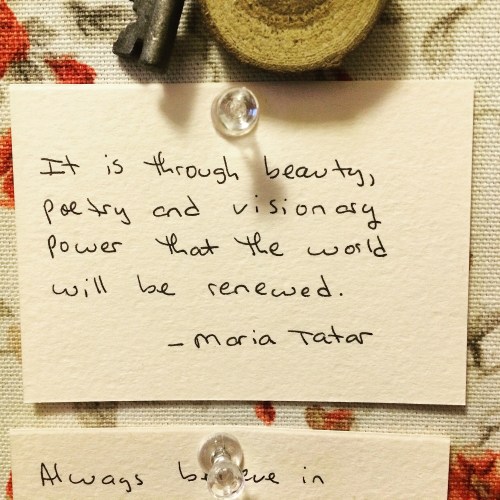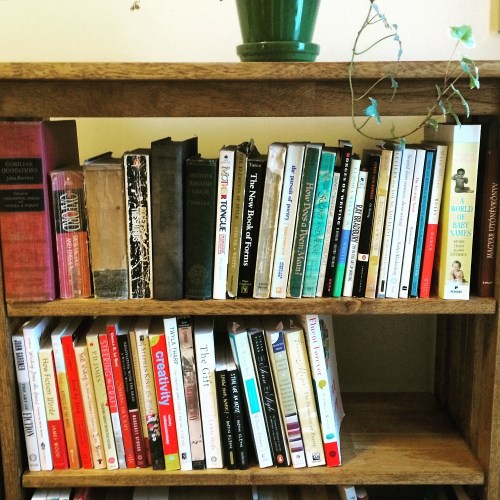Recently, I was looking at another writer’s biography and noticed that he had attended all sorts of prestigious writing residencies. And I thought, wait, am I supposed to be applying for those? Maybe I should be applying for residencies and grants . . . After all, they look good on your CV. Don’t they?
I had to remind myself to keep it real.
Here’s real: What is the purpose of residencies? They give you places to write. I already have a place to write: my home office is where I write everything, and the most comfortable writing place I know. What is the purpose of grants? To give you money so you can write. But since I teach more than full-time, the chance that a grant will replace my income, much less my benefits, is very small. So what residencies and grants would really give me, right now, are . . . a line on my CV. A reference in my biography. And that’s not enough.
I have to think about what is real because at one time, I went wrong . . . I made decisions based on prestige, on how the world would evaluate me. That was when I ended up at Harvard Law School. It was my last year of college, and I wanted to go on to a PhD program, specifically to study English literature. But my family discouraged me, so I applied to law school instead. I got into Harvard, so that seemed the obvious choice . . . I mean, Harvard Law is sort of like getting the world on a platter, right? Or so many people believe. The reality is that you’re never handed the world on a platter. I spent four mostly miserable years in law school, and three mostly miserable years working as a lawyer. Don’t get me wrong — I have a great deal of respect for good lawyers. I hope I was one of them. But it wasn’t for me because what was real, the deep underlying reality of my life, was wanting to write. I had wanted to write since I was a child. Instead, I was revising corporate contracts until 2 a.m. And I was deeply in educational debt.
So I paid off my law school loans (all of them, in three years, because I knew that otherwise I would die inside — and I had paid for law school entirely by myself, so they were exorbitant). I applied to graduate school. Then, I had to face the question of what was real again because I got into Boston University as well as several universities that were more prestigious, that were Ivies. But Boston University was the only one that would both pay for my tuition and provide me with a stipend I could live on. Was it worth taking on educational debt again for an Ivy League university on my CV? I actually had to think about that for a while. But in the end I decided that no, it wasn’t worth it. What was real, in this situation, would be the education I was getting, the focus on literature, the time to write.
As I’ve gotten older, I’ve gotten better at distinguishing what is real from what is not — or perhaps what is simply less real, less important. Real are the stories I write, the books I publish. Not a prestigious residency or grant, unless it leads directly to more stories, better books. Real is money for food and shelter. Real is raising my daughter. Real is having lovely things around me.
Hunger and cold are real. Fear and failure are not — they are just the way my mind perceives reality. But they are interpretations, not facts. Joy, on the other hand, is real. (Why joy and not fear? Because I usually realize that my fear is a misinterpretation of the world, whereas my joy rarely is. Joy leads me right most of the time. Fear, rarely. Although if I were to encounter a ravenous bear, then yes, my fear would be real, and I would listen to it.) Literary prizes are real if they result in more people reading my books, or represent people I respect recognizing my work. Those are real, but the important things are the quality of my work and the extent to which I am able to reach out, speak to people through my writing. Those are the things I need to focus on.
I’ve been online long enough to realized that most internet controversies are not real. They do not change any minds, and have no tangible result in the world of actual things. Real requires substance behind the appearance (which is why fear of ravenous bears is real, when there are actual ravenous bears in the vicinity).
I hope all of this makes sense? I feel as though I’m trying to describe something rather nebulous in words, which are concrete. But what I ask myself, over and over in my life, is this:
What is real?
Because I’m tempted by the unreal as much as anyone — by prestige, by what I’m supposed to be doing. According to whom? I’m not sure, probably the invisible audience we all create in our heads of people who are judging us. Don’t you do that? Don’t you imagine an audience of people who don’t even know you, judging you for your failures? Our imaginary audiences can be harsher than any actual people . . .
So I bring myself back again and again to that question, every time someone asks me to do something or I create a new project for myself. Am I doing this because it will have some real effect, because it’s something I actually want to do? Or am I doing it because it will look good in my biography? What is real to me, what do I truly care about, what will actually change my life or perhaps myself?
I’m a fan of Mari Kondo, the Japanese neatness guru. I try to follow her injunction to only keep those things that truly give me joy. (Although I have a lot of those things — my life is definitely not minimalist.) I’ve even folded my clothes the way she suggests . . . But I think that message should be applied not only to how we organize our stuff, but also how we organize our time. What is real, what sparks joy? Some things that are real may not spark joy, certainly not all the time — if you’re working at a job you dislike because you need to pay off your educational loans, then you may not get a lot of daily joy from it. But you will at least have the satisfaction of knowing those loans are going away, month by month. (For a while, my greatest sense of joy was in looking at my diminishing loan balance.) That sense of accomplishment is real — it is a thing that exists and is important.
Sometimes I practice distinguishing what is real, because our culture makes it so difficult to tell the difference. It sells us substances that are not real food. It tells us companies are worth a billion dollars based on stock valuations that are going to change tomorrow. It praises celebrities who are famous for being famous, without actual accomplishments.
Do this: find the real, underneath. If you’re standing on that, I find, you’re standing on solid ground. You have a sense of stability, a sense that you know what’s what. When I lose that sense, when I’m not sure where I’m going and the world seems to be spinning out of control, I think, what is real right now? Lunch. Papers to grade. The fact that I have a warm jacket, so I will not be cold when I go outside, although it’s snowing. And there’s comfort and joy in that solidity.

These are two pictures from my office. First, a quotation pinned to the corkboard above my desk . . .

And second, my writing books — the ones I’ve found most valuable and reread periodically.


This is why I love you. Thank you for keeping it real.
Lovely post. Similar to you, I had to create some silence in my life to hear the call of what I actually wanted in life. Now I can focus on the real goal whenever choices came my way.
I only made it through my second year of law school (encouraged to attend by my lawyer mother) before realizing I didn’t actually want to be a lawyer. I wanted a career in the arts. I dropped out of law school and have been struggling financially ever since – but have done more artistically than I would have had time/energy for had I gone on to finish law school.
Thank you for this! I am about to graduate college so this is so relevant.
Thank you for this…it is so relevant to me and your advice has helped to focus/calm my worries that I am failing for not going to the correct establishments, getting the prestigious prizes. I love writing, I have a warm coat and people around me, my job is paying for them to live. I also recently discovered the Kondo style of decluttering and found it very helpful. Applying it to the mind is a wise idea.
Thank you for writing this, and thank you to John Platt for posting it on Facebook, where I found it.
Sometimes only you have the ability to keep it real for yourself. Everyone else is slightly biased.
Once more, an intelligent, uplifting post. You hit all the right notes and this is also seen in your poems and stories. Decluttering ( argh, I am so busy!) is always there but lately I have found a kind of decluttering of my soul.